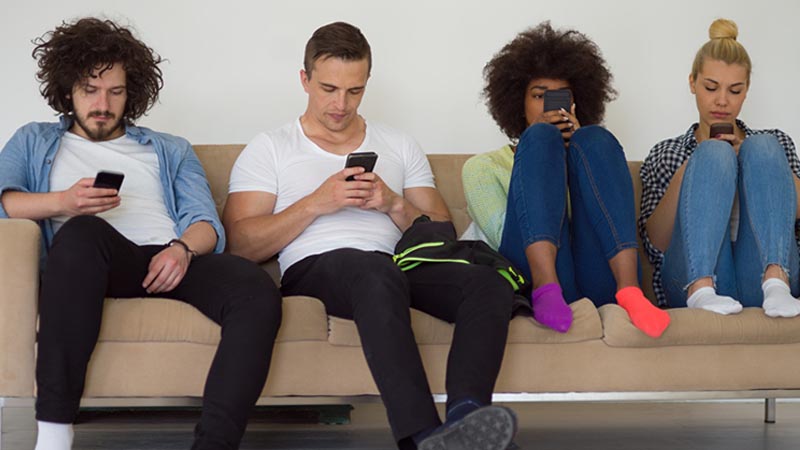The UCLPress study "The Global Smartphone" comes to a staggering conclusion: We live in our smartphones now and feel similar emotions when it comes to our home or our cell phone. Our columnist Markus Sekulla doesn't want that for to be true for his life and has built exit options into his life.

We all know this picture: Next to you at a big dining table are the people who are family and friends to us... And everyone is looking at their smartphones. When I once started checking Twitter after dinner about 12 years ago, my friends went crazy and called me an online addict. Today, these images are almost part of pop culture. Even well-known movies like the German comedy "The Perfect Secret" deal with the topic of smartphones at the dinner table. But this situation is just one of many in which smartphones have hijacked interpersonal interaction.
The device that used to be a phone - now telephoning is also just one app of many - has now become our central point in life. It's always with us, carries our biggest secrets hidden behind a code, and serves as a savior in many life situations.
But let's put it in a positive light: The smartphone is the Swiss army knife of the 21st century. Who needs navigation devices, an MP3 player or a digital camera when a single device can offer all these functions? Our today’s all-in-one device that even comes up a notch short for me. When I leave the house, I carry my smartphone, my wallet (because of my ID card, driver's license and, in Germany, cash) and my keys. When I go to get my vaccinations, I also need my old yellow vaccination card. A smartphone could do all that easily, but it will only do so to a limited extent in May 2021. I hope many of these things will happen in the nearer future and then I can leave the house with nothing more than my smartphone. The technology is there, what's needed is a change of mindset.
In recent years the smartphone has become our interface between reality and the digital world. A kind of key to get in touch with the whole world and also to stay in touch. Social media, Wikipedia, blogs, official websites of companies and organizations lead to the fact that the flow of information and information gathering has never been higher than at the present time.
But this also leads to deep changes in our lives. New and important spaces of interaction are emerging. For example, important political debates are no longer held on the street or on telly, but are increasingly shifting to the internet and social media. Not always constructive, but often enriching and complementary to the current state of knowledge.
Friendships and partnerships emerge across national borders. Family and close friends who may live in other countries or at least in other places within a country are no longer unreachable, but can always be contacted via Whatsapp, Facetime, Instagram and the like. The good of social togetherness thus takes on a whole new meaning and depth.
But in addition to all the positive aspects, there is also the other side of the coin: More and more often, you see people spending more time with their smartphone in a restaurant or at the dinner table than with the other person. The recent study mentioned above looked at this phenomenon.
Study leader Prof. Daniel Miller sums it up as follows: "The smartphone is no longer a device that we merely use. It is now a place where we spend our lives. A person we spend time with physically can suddenly disappear. She returns 'home' in the smartphone."
At first reading, I find this statement rather heavy and exaggerated. But it's not, when you take a closer look. Platforms such as Instagram, TikTok, YouTube and Twich in particular offer extreme addiction potential. The companies are aware and – besides that being part of their business model, offer reminder that you only want to spend XYZ minutes a day on the app. But the reality is usually different. However, social media, video or gaming apps are not only time killers, but they keep distracting us from work, activities with friends or our actual hobbies. All of this is fueled by the dopamine output when we experience approval in the digital world. And that is a very addictive chemical for our mind.
Another danger is the always-on mentality. We are available to anyone at any time in any place. Be it via cell phone number, email or social media. Your boss wants a task done quickly? Quick ring and now it’s on our table. Customers would still like to have more details on the current status of their project? They email and ask for it. On some days we don't even get to put the smartphone aside anymore. It's our constant companion. I'm thinking back to a vacation where I was on standby and sat by the pool for many hours working #neveragain. More and more people don't know how to switch off after regular working hours, which can lead to burnouts or other mental illnesses in the long run.
For me personally, I have developed a whole range of strategies to ensure that my smartphone remains my friend and does not become my enemy. Here’s a list. Feel free to add to it in the comment section.
All of these points have led me to keep my smartphone consumption at a good level. Since I try to be a mindful person, I try to avoid multitasking as much as possible. When I talk to other people, I give them my complete attention. I didn't do that 12 years ago, but today I'm often the only one at the table not looking at my phone.
Text: Markus Sekulla
Most popular